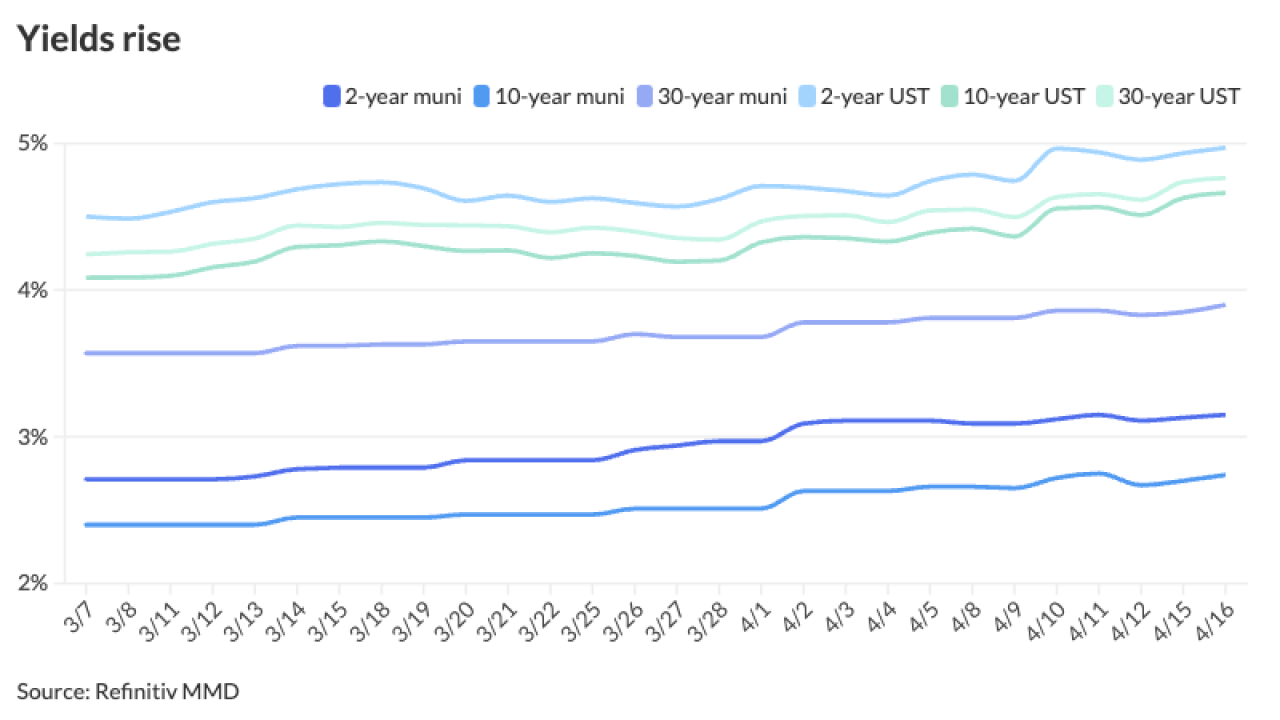Substantial supply-driven weakness continued to plague the municipal market Tuesday as the Dallas Independent School District competitively sold $950 million of taxable Build America Bonds amid a rout that saw a number of deals being pulled from the calendar and 30-year yields shooting to 15-month highs.
Traders said municipals were weaker by about 10 to 12 basis points overall, though losses extended up to 20 basis points in the intermediate part of the curve.
“The correction of the last seven or eight trading days continued to pick up momentum,” said Parker Colvin, managing director of underwriting at Stone & Youngberg LLC in San Francisco.
Pressure in the secondary market and the abundance of supply worked in combination to move prices lower, he said.
“The Street is not supporting the market and there is a lot of uncertainty over what bonds are worth,” Colvin said. “Without more certainty with regard to pricing and relative value, no one wants to be the first one back in buying.”
In new-issue pricing Tuesday, DISD sold $950.3 million of unlimited-tax school building bonds structured as taxable Series 2010C direct-payment BABs that were won competitively by Barclays Capital.
The Series 2010C bonds mature serially from 2018 to 2026, with term bonds in 2030 and 2035. Yields range from 3.849% with a 4.05% coupon in 2018, or 2.50% after the 35% federal subsidy, to 6.247% with a 6.45% coupon in 2035, or 4.06% after the subsidy.
The deal also contained a $70 million tax-exempt Series 2010B, which was also competitively sold to Barclays. Yields range from 0.90% with a 3% coupon in 2013 to 2.66% with a 5% coupon in 2018.
The bonds are backed by the Texas Permanent School Fund guarantee program and rated Aa2 by Moody’s Investors Service, A-plus by Standard & Poor’s, and AA by Fitch Ratings.
The Municipal Market Data’s triple-A scale yielded 2.93% in 10 years Tuesday, 18 basis points higher than Monday’s 2.75%, while the 20-year scale yielded 4.03%, 15 basis points more than Monday’s 3.88%. The scale for 30-year debt climbed 12 basis points to 4.42% Tuesday from 4.31% Monday.
The MMD 30-year triple-A scale has now increased by 50 basis points since last Monday to reach its highest level in nearly 15 months. It hasn’t been higher since Aug. 28, 2009, when it was also 4.42%.
Meanwhile, 20-year debt is at its highest level since Aug. 19, 2009, when it yielded 4.04%, and 10-year yields are at their highest level since June 23, when the yield was 2.94%, according to MMD.
“All bonds have traded at concessions to the market and now dealers are trying to work those positions off,” a New York trader at a large institutional firm said. “The dealer community doesn’t have a large appetite. We’re just trying to search out levels.”
Tuesday’s triple-A muni scale in 10 years was at 102.8% of comparable Treasuries and 30-year munis were at 103.8%, according to MMD, with Tuesday’s weakness pushing both past 100%. Meanwhile, 30-year tax-exempt triple-A general obligation bonds were at 108.3% of the comparable London Interbank Offered Rate.
The weakness prompted a number of refunding deals to be pulled from the market, including a $98.9 million refunding offering for Texas’ Leander Independent School District scheduled for pricing by Dallas-based RBC Capital Markets.
Georgia’s Gwinnett County Water and Sewerage Authority initially competitively sold a $180.6 million refunding to Bank of America Merrill Lynch, but chose not to award the bonds due to the sell-off, which dramatically affected the issuer’s projected refunding savings. The deal’s status going forward was unclear, according to a source at the firm.
The postponements were not restricted to refundings. A $157 million Orange County, Calif., Sanitation District taxable BAB sale was also postponed indefinitely due to market conditions.
“Investors are cautious about getting back into the market until they see more signs of broader support,” Colvin said. “Munis could easily get oversold. When it’s a steady downdraft like this, buyers will be very reluctant to come back in all at once, or by themselves.”
However, he said, absolute levels are becoming attractive enough to overcome sell-off fears and participants may begin selectively putting their available cash to work.
Colvin also noted that long-end yields in the California market were trading substantially wider than just two weeks ago, with a $2 billion long-term BAB deal still to come this week. He noted that Bay Area Toll Authority revenue bonds due in 2032 traded at a 5.40% yield Tuesday, which compares to its original 4.51% yield in late October.
“By that measure the market is up 91 basis points in two and a half weeks,” he said.
Tuesday’s Treasury market showed gains as recent price cuts, data showing weak economic growth, and the absence of inflation drew buyers in the opening days of the Federal Reserve’s program of large-scale Treasuries purchases.
The benchmark 10-year note finished at 2.84% after opening at 2.95%. The 30-year bond finished at 4.27% after opening at 4.41%. The two-year note finished at 0.51% after opening at 0.53%.
Elsewhere in the new-issue market, the South Carolina Transportation Infrastructure Bank sold $191.8 million of revenue bonds in the competitive market with a final 2040 maturity that carried a 5.375% coupon. The yield was not available by press time. The bonds are rated A1 by Moody’s and A by Fitch and were won by Bank of America Merrill.
Also Tuesday, the retail order period continued on a $10 billion revenue anticipation note sale from California. Lead manager JPMorgan will price the offering for institutional investors Wednesday.
The deal breaks the previous record for largest note deal, also set by the Golden State, which sold $9 billion of Rans in October 2002, according to data from Thomson Reuters. Tuesday’s retail pricing information was not available by press time. During the first day of the retail order period Monday, California sold 44.3% of the total offering, for $4.43 billion.
Of the notes maturing on May 25, 2011, $563.6 million was sold to retail Monday, while $3.86 billion of debt maturing on June 28 of next year went to retail.
According to the state Treasurer’s office, preliminary prices quoted to investors during the retail period were 1.0% to 1.25% for the May maturity and 1.25% to 1.50% for the June maturity.





